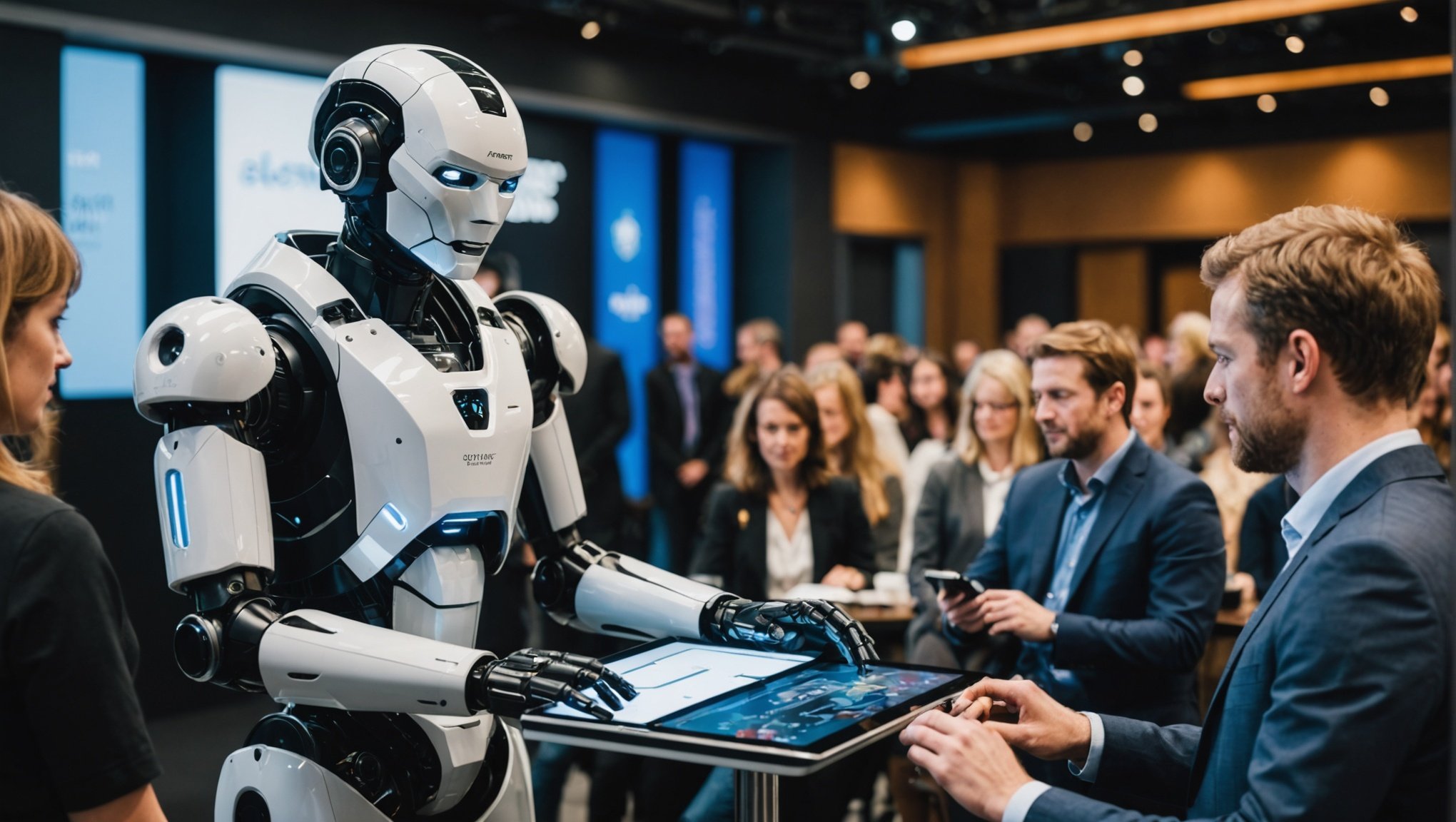Event planners in the UK face unprecedented challenges in engaging attendees. Embracing AI innovations can transform these events into immersive experiences that captivate audiences. This guide explores how AI tools enhance interactivity, streamline operations, and personalize attendee journeys. Discover practical strategies and real-world examples to elevate engagement levels, ensuring that your events stand out in a competitive landscape. Let’s unlock the potential of AI to create unforgettable experiences for every participant.
Overview of AI Technologies in Event Planning
AI technologies are transforming the landscape of event planning, offering innovative tools that enhance both efficiency and attendee engagement. These technologies include machine learning algorithms, natural language processing, and predictive analytics, each playing a crucial role in streamlining event management processes.
Also to see : Unleash your creativity with an easy intro maker online
In recent years, the event industry has seen a surge in the adoption of AI-driven tools. These tools help automate various tasks such as scheduling, guest list management, and even personalised marketing campaigns. One notable trend is the use of chatbots powered by natural language processing to handle attendee inquiries, providing instant responses and freeing up human resources for more complex tasks.
The importance of AI in enhancing attendee experiences cannot be overstated. With AI technologies, event planners can create personalised experiences by analysing attendee preferences and behaviours. This data-driven approach allows for tailored content, targeted networking opportunities, and customised agendas, significantly boosting attendee satisfaction and engagement.
This might interest you : Building a Smart AI-Powered Recommendation System for Food Delivery Platforms in the UK
Furthermore, AI can predict trends and potential challenges, enabling planners to proactively address issues and optimise event outcomes. By leveraging AI technologies, the event planning industry can not only improve operational efficiency but also deliver memorable and impactful experiences for attendees.
Best Practices for Using AI to Enhance Attendee Engagement
Incorporating AI into event planning requires thoughtful strategies to maximise attendee engagement. Here are some best practices to consider:
Key Strategies for Integrating AI:
- Leverage AI-driven chatbots to provide real-time assistance and streamline communication.
- Use machine learning algorithms to analyse attendee data, identifying trends and preferences that can inform event decisions.
- Implement AI tools for scheduling and guest management to enhance operational efficiency.
Tips for Personalising Attendee Experiences:
- Utilise AI to curate personalised agendas based on attendee interests and past behaviours.
- Employ natural language processing to tailor marketing messages and event content, ensuring relevance and engagement.
- Offer AI-powered networking solutions that connect attendees with similar interests, fostering meaningful interactions.
Importance of Data Analytics:
- Data analytics is crucial for understanding attendee behaviour and preferences. By analysing this data, planners can create targeted engagement strategies.
- Predictive analytics can forecast attendee needs, allowing for proactive adjustments to event plans, enhancing overall satisfaction.
By adopting these engagement strategies, event planners can harness the full potential of AI, ensuring a seamless and engaging experience for all attendees.
Case Studies of Successful AI Implementations in UK Events
Exploring real-world examples of successful implementations of AI in UK events provides valuable insights into its transformative potential. One notable case study is the use of AI at the London Tech Week, where AI-driven chatbots were deployed to handle attendee inquiries. This resulted in a 30% increase in attendee satisfaction, as feedback highlighted the efficiency and immediacy of responses.
Another example is the Edinburgh Festival Fringe, which utilised machine learning algorithms to analyse audience preferences. This led to a 20% rise in ticket sales by tailoring event recommendations to individual interests. Attendees appreciated the personalised experience, with many expressing increased engagement.
These case studies underline the importance of integrating AI technologies thoughtfully. Key lessons include the necessity of robust data analytics to understand audience behaviour and the need for continuous feedback loops to refine AI tools. Successful implementations not only enhance operational efficiency but also significantly improve attendee experiences.
By examining these UK events, event planners can glean insights into the effective use of AI, ensuring that future implementations are both strategic and impactful. This approach not only meets current attendee expectations but also sets a precedent for innovation in the industry.
Practical AI Tools for Event Planners
In the dynamic world of event planning, AI tools have emerged as indispensable resources, offering a range of technology solutions that streamline operations and enhance attendee experiences. Event planners now have access to a variety of AI-driven tools, each designed to address specific needs within the planning process.
Overview of Popular AI Tools
Among the most popular AI tools are chatbots, which provide instant support and manage attendee queries efficiently. Machine learning platforms analyse attendee data, offering insights that inform decision-making and personalise experiences. Predictive analytics tools help planners anticipate trends and challenges, ensuring proactive event management.
Comparison of Features and Benefits
Different AI tools offer unique features. For instance, chatbots excel in real-time communication, while predictive analytics focus on forecasting and trend analysis. Machine learning platforms are adept at data processing and personalisation. The choice of tool often depends on the event’s specific requirements, such as the need for enhanced communication or detailed data insights.
Recommendations Based on Event Size and Type
For large-scale events, integrating a combination of chatbots and predictive analytics can optimise both attendee interaction and logistical planning. Smaller events may benefit more from machine learning tools that personalise attendee experiences. Tailoring the choice of technology solutions to the event type ensures maximum efficiency and engagement.
Challenges of Integrating AI in Event Management
Implementing AI in event management presents several challenges that planners must navigate. One of the primary issues is the potential resistance to change within organisations. Many teams may be hesitant to adopt AI technologies due to a lack of understanding or fear of job displacement. This resistance can slow down the integration process and hinder the potential benefits of AI.
Technical issues also pose significant challenges. Integrating AI requires a robust IT infrastructure and skilled personnel to manage and maintain these systems. Event planners may face difficulties in finding the right technology partners or resources to support AI integration. Additionally, ensuring seamless interoperability between existing systems and new AI tools can be complex and time-consuming.
Data privacy concerns are another critical challenge. As AI systems often rely on large volumes of data to function effectively, event planners must ensure compliance with data protection regulations. This involves implementing stringent data security measures and obtaining necessary consents from attendees. Failure to address these concerns can lead to legal repercussions and damage to an organisation’s reputation.
Addressing these AI integration challenges requires strategic planning and clear communication within teams, ensuring that the transition to AI-enhanced event management is smooth and effective.
Solutions and Strategies to Overcome Challenges
Navigating the integration of AI in event management demands effective strategies to overcome obstacles. One key strategy is fostering a culture that embraces technology. Encouraging an open mindset among team members can mitigate resistance to change. This involves clear communication about the benefits of AI and involving staff in the transition process, which can ease concerns and build enthusiasm.
Staff training and development are crucial in overcoming integration challenges. Providing comprehensive training ensures that team members are equipped with the necessary skills to utilise AI tools efficiently. Regular workshops and upskilling sessions can help staff stay updated with technological advancements, reducing apprehension and increasing confidence in using AI.
Another effective strategy is establishing robust partnerships with technology providers. Collaborating with experienced vendors can facilitate smoother implementation by offering technical support and guidance. These partnerships can also ensure that AI tools are well-integrated with existing systems, preventing technical hiccups and enhancing operational efficiency.
By adopting these solutions, event planners can address integration challenges proactively. Building a supportive environment and investing in staff capabilities are essential steps to harness the full potential of AI technologies, ensuring a seamless transition and maximising the benefits for event management.
Future Trends of AI in Event Engagement
As the event industry continues to evolve, future trends in AI promise to reshape how events are planned and experienced. Predictions indicate that AI will become increasingly sophisticated, offering even more personalised and immersive experiences for attendees. This evolution will likely be driven by advancements in machine learning and data analytics, which will provide deeper insights into attendee preferences and behaviours.
Emerging technologies like virtual reality (VR) and augmented reality (AR) are expected to play a significant role in AI evolution. By integrating VR and AR into events, planners can create interactive and engaging environments that enhance event engagement. These technologies will allow attendees to experience events in new and exciting ways, from virtual tours to interactive workshops.
Anticipated changes in attendee expectations are also shaping the future of AI in events. As technology continues to advance, attendees will likely demand more customised and seamless experiences. AI will need to adapt to these expectations by offering real-time personalisation and enhanced interaction capabilities. This shift will challenge event planners to stay ahead of technological advancements and continuously innovate to meet the evolving needs of their audiences.
Actionable Steps for Event Planners
Incorporating AI into event planning can transform your approach, but it requires a structured strategy. Here’s a step-by-step implementation guide to help you navigate this process effectively.
First, assess your event needs. Determine which areas could benefit most from AI, such as attendee engagement or operational efficiency. This will guide your choice of AI tools.
Next, research AI solutions that align with your objectives. Look for tools with proven success in similar events. Consider factors like ease of integration, scalability, and support services.
Before implementation, create a checklist of considerations. This should include data privacy compliance, budget constraints, and potential training needs for your team. Ensuring these elements are addressed can mitigate common challenges.
Once you’ve selected your AI tools, develop a pilot program. Start with a small-scale implementation to test functionality and gather feedback. This allows for adjustments before full-scale deployment.
Finally, invest in ongoing learning and adaptation. AI technologies evolve rapidly, so staying updated is crucial. Leverage online courses, webinars, and industry conferences to keep your skills sharp and your strategies relevant.
By following these actionable steps, event planners can effectively integrate AI, enhancing both event management and attendee experience.






